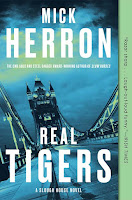12. Mick Herron, Real Tigers (2016) (6/18/25)
The third in the Slow Horses series. Much of what I said in April about the second installment still holds: impossible to summarize, Herron's style—fast-paced, wryly humorous, great detail and characterization—super enjoyable, and I'm already eager to move on to the next in the series! Though I think I'll wait and try to fit in some more serious reading for at least a little while.I had seen the TV version of this one and vaguely remembered how it went, including the kidnapping of a central Slough House denizen in order to stimulate a break-in into first one archives, then another—both of which, of course, went awry. I was actually kind of glad to have a visual memory of the final scenes; it made it less claustrophobic, gave more a sense of space, of physicality. And of course, to envision Gary Oldman as the curmudgeon Jackson Lamb: perfect.
But I had forgotten all the political machinations that ended up being behind the kidnapping and break-ins, and although at one point in the book I despaired of getting it straight (it doesn't help that the two main MI5 rivals have somewhat similar names—Diana Taverner and Ingrid Tearney, Taverner and Tearney), with enough deft retelling of various bits of backstory, in various contexts, I think I understand what was at stake. And just who, in the end—by handing over a coveted file that ends up containing nothing but a copy of the Angling Times—wins. At least for the moment. The Slow Horses may be screw-ups, but when called upon to fight for what's right, they deliver.
As usual with my reports on mysteries, I'm sure this report is more mysterious than anything else. But consider it a record for myself. Who knows, it's possible I'll be able to make sense of this in a few months' time. But not guaranteed.
I did flag one passage, the start of a chapter near the end. Again, it doesn't give much insight into the story per se, but it's a decent example of Herron's style:
The pub was off Great Portland Street, and she remembered being here once before, a wake for a dead agent, Dieter Hess. The usual pious utterances, when the truth was, like most doubles, you could trust the man as far as you could chuck a ten-pound note: where it fell, he'd be waiting. But that was the nature of the beast. A spook threw shadows like a monkey puzzle tree's; you could catch whiplash hearing one describe yesterday's weather.
Diana Taverner was drinking Johnny Walker Black Label—a special occasion tipple—and trying to work out how special the occasion was.
That Dame Ingrid had heard the sound of one big penny dropping was beyond dispute. Whether she'd heard it in time to catch the penny on the bounce was another matter. If she had, Taverner's career would probably not see out the week. It was one thing to plot and seethe in corners: that was what office life was about. But to actually set wheels in motion was a declaration of war, and the only war you could win against an enemy like Dame Ingrid was one that was over before the starting gun was fired.
But it had been too good to miss, this opportunity . . .
(A "double" being, no doubt, a double agent, and a spook being any kind of agent, double or no, but one adept at obfuscation.)
Spook Street next. Though sadly, none of the local libraries have it. But I'm pretty sure I spotted it the other day at BookWorks in Pacfic Grove. I never complain about having to visit a bookstore.


No comments:
Post a Comment